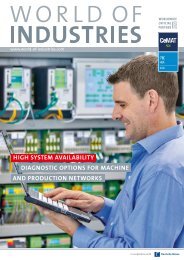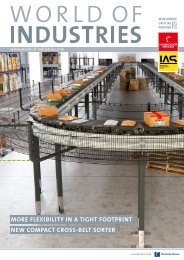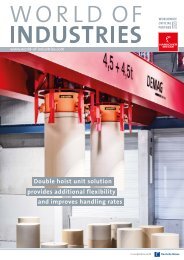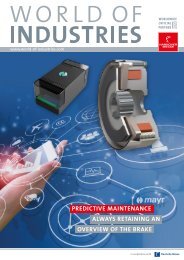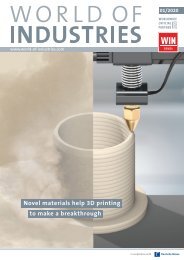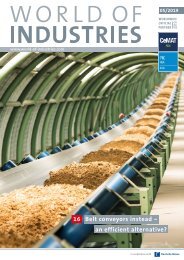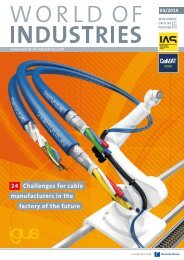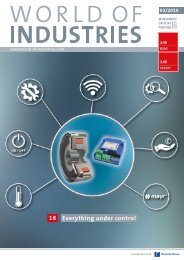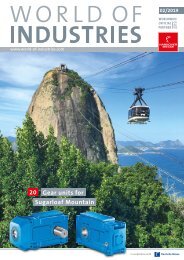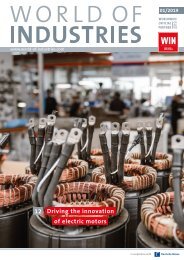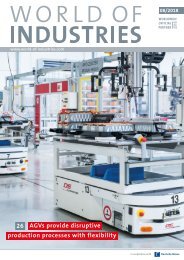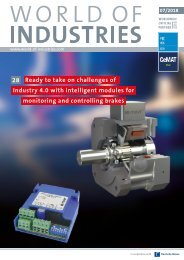MDA Technologies 3/2016
MDA Technologies 3/2016
MDA Technologies 3/2016
- TAGS
- mda
- technologies
Create successful ePaper yourself
Turn your PDF publications into a flip-book with our unique Google optimized e-Paper software.
Antriebstechnik<br />
Focus on industry sector<br />
Automobiles sector is expected to grow roughly 4 % in <strong>2016</strong>. This<br />
sector benefits from the low gas prices, strong job growth, and<br />
replacement cycle that encourage the purchase of vehicles; this<br />
favours the automobiles and its associated industry. The iron<br />
and steel industry is predicted to decline by 2-3 % in the next 2<br />
years. In the US, the capacity utilization in the steel industry has<br />
improved as compared to last year and there is also a significant<br />
progress in bringing down the steel inventories. Industrial<br />
machinery sector along with engine, turbine and power transmission<br />
equipment is projected to decline in <strong>2016</strong> and then rise in<br />
2017. World Semiconductor Trade Statistics predicts flat markets in<br />
<strong>2016</strong> and 3 % growth in 2017. Optoelectronics and sensors will<br />
remain the growth products in the semiconductor industry. Industrial<br />
process instruments measure, control, or display process<br />
activities such as temperature, pressure, vacuum, and viscosity etc.<br />
This sector is expected to grow constantly around 3 % in <strong>2016</strong>, 2017,<br />
and 2018. Electrical equipment sector consists of transformers,<br />
motors and generators and industrial controls. The production<br />
levels are projected to decline 2 % in <strong>2016</strong> [1].<br />
North America and EU: strategic and trade partners<br />
The global economy hinges on the performance of the EU and the<br />
U.S, accounting for almost half of the world’s economic output and<br />
40 % of global trade. The importance of economic cooperation<br />
between them is much more significant and urgent. On both sides<br />
of the Atlantic, it is important to strengthen the economies by<br />
ensuring long-term stability. This is where the ‘Transatlantic Trade<br />
and Investment Partnership’ agreement comes into picture. T-TIP<br />
aims to provide the economic and strategic framework for long<br />
term growth and sustainability. For thousands of companies in<br />
Germany and other parts of Europe, unnecessary barriers to trade<br />
and investment – tariffs, red tape, delays, and uncertainty over<br />
product requirements – stand between entrepreneurs and potential<br />
customers. Today, companies have to assume additional costs of<br />
between 5 and 20 % because their products have to be specially<br />
equipped for the US market. Removing these barriers makes sense.<br />
T-TIP and the German mechanical engineering sector<br />
Mechanical engineering firms in Germany believe that a thoroughly<br />
negotiated free trade agreement with the USA would offer a great<br />
opportunity for more exports to the United States. There are lot of<br />
opinions and analysis claiming that the ‘German Mittelstand’, considered<br />
as the backbone of the German economy, in particular<br />
would be subjected only to disadvantages and be crushed by large<br />
corporations as a result of the T-TIP. This paints a totally distorted<br />
picture as T-TIP has provisions for establishing a firm investor protection<br />
policy which offers legal security, particularly to SME’s. This talk<br />
of small and medium scale industry under threat completely fails to<br />
recognise the potential that would arise from a free trade agreement<br />
with the USA, particularly for these medium-sized companies.<br />
The benefits of TTIP are:<br />
n lower engineering costs, lower development and manufacturing<br />
costs, increased manufacturer/supplier confidence, reduced time<br />
from factory to market.<br />
n lEliminating customs duties would bring cost savings of hundreds<br />
of millions in the German mechanical engineering industry<br />
alone.<br />
n lIn addition, standardisation of licensing requirements and norms<br />
would mean that high amount material costs and time would be<br />
saved too.<br />
Mechanical Engineering products account for 13 % of EU exports<br />
to the USA. In fact, last year mechanical engineering accounted for<br />
a higher share of EU exports to the USA than the automobile industry.<br />
VDMA, the German Mechanical Engineering Association, the<br />
largest engineering association in Europe, has firmly supported the<br />
T-TIP. According to VDMA estimates, mechanical engineering firms<br />
currently incur additional costs of 5 to 20 % to adapt their products<br />
to the regulations of the US market. This is because of technical<br />
conversion and the need for local recertification, particularly for<br />
electrical components, even when approval has already been granted<br />
for the European market.<br />
At a meeting in Munich on 1 st March, VDMA discussed various<br />
aspects that concern the capital goods industry with the US Trade<br />
Representative and chief negotiator for mechanical engineering<br />
and the automotive industry, Bryant Trick.<br />
In the last weeks of February, Brussels hosted the 12 th round of<br />
T-TIP negotiations. The agenda of these negotiations included topics<br />
of investor protection, regulatory cooperation and opening up the<br />
US procurement markets, followed by discussions on rules of origin<br />
and public procurement. Discussions on these topics are intended<br />
to facilitate existing and future cooperation on regulatory issues.<br />
Regardless of the current political irritation between Europe and<br />
America, economically and strategically the choice is clear. By<br />
lowering barriers to trade and investment, T-TIP will reinforce the<br />
position of American and EU industries. But the risks and challenges<br />
are deeply concerning as well. By the end of <strong>2016</strong>, the negotiations<br />
will end and a final decision will be made regarding T-TIP. z<br />
Photographs: teaser fotolia<br />
Literature note:<br />
[1]The numeric data is acquired from various U.S government<br />
websites and sources<br />
Motion, Drive and Automation<br />
30<br />
Maintenance-free bearings<br />
support one of the world’s longest<br />
suspension bridges<br />
I N T E R N AT I O N A L<br />
E D I T I O N<br />
6<br />
September 2013<br />
Click to read previous issues.<br />
Inspiration is just one click away.<br />
News about the following markets:<br />
16 geared<br />
Gravel plant reduces costs<br />
and maintenance by using<br />
motors<br />
www.mda-technologies.com<br />
18 26 Winter<br />
Standard components are<br />
used to drive scraper chain<br />
conveyors in Norway<br />
Air Springs: keeping<br />
things moving at the 2014<br />
Olympic Games<br />
in cooperation with Fluidtechnik<br />
<strong>MDA</strong> <strong>Technologies</strong> 3/<strong>2016</strong>



